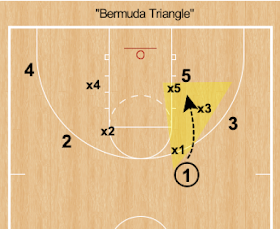Bill Russell said that imagination leads to innovation leading to differentiation.
Great companies such as 3M devote some employee work to 'thinking time' to develop new products. "Post-It Notes" became a spinoff from a failed glue that wasn't sticky enough.
A third of games are decided by two possessions or less. How can our process change our results in those games?
1. "Give me a reason."
Skill, scrimmage, strategy?
2a. Be efficient.
Condition within drills. We could never get anything close to adequate practice time. "Don't waste time."
2b. Be inclusive. The best activities often include offense, defense, decision-making, and competition. Sounds like strategic scrimmage.
3. Talk it up. If we don't talk in practice, we won't talk during games. Make practice talk a priority.
4. Steal. Steal from other coaches, other sports, other domains.
- Most coaches enjoy having other coaches watch practice.
- Small-sided games translates from soccer futsal.
- Werner Von Braun's "Monday Notes" shared the progress and pitfalls of the space program with developers. We need an equivalent to document our gains and areas to improve.
6. "Measure it." Develop a system to measure progress and performance.
7. "Love our losses." Study failure. What can we learn? Were we deficient in skill, strategy, physicality and toughness, or psychology/resistance? How would a mentor review the loss? What execution, decision, or strategy needs to be rethought?
8. "Lucky 13." Doc Rivers believed in showing no more than thirteen video clips to share teaching points.
9. "Eyes open." Be on the lookout for strategic genius.
Lagniappe. Build skill.
ミッドポスト Mid post ワークアウト Work out
— ゆうや君 (@riberaru_basket) October 31, 2022
◆Face Up Pull
◆Side Jab + Step Back
◆Side Jab + Spin
◆Side Jab + Land on 2 Fade
◆Front Pivot Spin Offpic.twitter.com/UZjITF0Fis

















